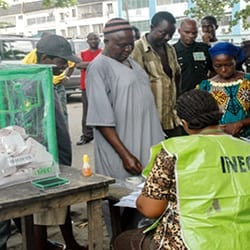On Saturday, millions of Nigerians will cast a ballot to decide who will lead the country for the next four years. The general election has generated a lot of public interest at both the domestic and international levels. Voters will have to decide between the perceived “underperforming” incumbent, President Goodluck Jonathan, and a former military ruler, retired Gen. Muhammadu Buhari. The ruling party, the People’s Democratic Party, has been in power since Nigeria returned to civilian rule in 1999, but it is now facing a strong challenge from the All Progressive Congress, a coalition of several of the country’s major political parties.
The presidential and National Assembly elections were originally set to take place on Feb. 14, to be followed by the governorship and state assembly elections on Feb. 28. However, one week before the elections, the Independent National Electoral Commission (INEC) announced a postponement of six weeks, with presidential and National Assembly elections taking place on March 28 and governorship and state assembly elections on April 11. The main reason given for the postponement was the ongoing Boko Haram insurgency in northeast Nigeria and, consequently, the military’s inability to guarantee security for the elections. Another reason was the fact that a huge percentage of registered voters in Nigeria had not collected their permanent voter cards (PVCs) and hence were at risk of being disenfranchised.
Evidently, the election campaigns of the two major parties have been framed around the Boko Haram insurgency, and the benchmark for winning the election is woven around the narrative of which party is more capable of defeating the militia group. While political analysts and election pundits could have predicted a clear win for Buhari if the election had been held six weeks ago, it is not so clear now. It appears that President Jonathan and the ruling party hold the advantage now, due to recent victories in the fight against Boko Haram. The Nigerian military reclaimed all of the major towns controlled by Boko Haram just a few weeks ago, including Gwoza, the acclaimed Boko Haram headquarters (this victory was not without the help of the African Union-backed multinational joint task force involving the armies of Nigeria, Niger, Cameroon and Chad). Furthermore, the president has stated that within one month, all the territories controlled by Boko Haram will be recovered.
However, even if President Jonathan does win re-election, he is unlikely to win a landslide victory as in 2011, when Buhari won in 12 northern states and Jonathan won all the southern states, including the Middle Belt states. The Boko Haram crisis has been largely confined to the north, so it is expected that the impact on voters will be largely felt here. Buhari, a Muslim northerner, will likely receive the greater percentage of votes in the northwest and northeast. Even so, the endorsement of Jonathan by the Arewa Initiative for Peaceful Co-existence in Southern Nigeria (AIPCSN), boasting 10 million northerners living in 17 southern states, and the support of key northerners may help Jonathan win some northern votes.
It is also very possible that Jonathan may lose the crucial votes of some non-Muslims in the Middle Belt states of Nassarawa, Kaduna and the capital city, Abuja. These are people who are disgruntled over the government’s failure to protect lives and properties against Boko Haram’s terrorist attacks. These voters will be forced to put their faith in Buhari. In the Southeast and South-South regions, Jonathan stands a great chance of winning most of the votes, while Buhari is likely to win most of the votes in the Southwest.
In the meantime, the threat of a potential Boko Haram attack and actual coordinated attacks are enough to discourage some people from coming out to vote. Ultimately, the northern states — particularly the northeast states — will be most affected, putting Buhari at a disadvantage because he expects most of his votes from the north.
Looking forward, whoever wins the election will have to battle with the notion of state legitimacy. A legitimate state is one that guarantees economic security for the majority of its citizens or one that creates and sustains an enabling environment for such. The opposition party has promised to fight corruption and strengthen Nigeria’s institutions. This is vital, as corruption has done a great deal in delegitimizing the state and expanding inequalities. With the recent fall in oil prices and the devaluation of the Nigerian currency, naira — including all other economic problems that are attendant upon it — it remains very doubtful how the fight against Boko Haram can be won legitimately.
The use of extreme force only stands the chance of sustaining the crisis, because the government will be forced to use the bulk of its budget and resources on security rather than the much more viable and rewarding economic diversification and growth. The Niger Delta region still remains precarious, since the Nigerian government’s amnesty program for militants, which ended the conflict in 2009, expires this year. We might have two insurgencies to battle with then, and the capacity of the military to contain both can only be imagined.
Michael Nwankpa is a researcher at the Crucible Centre for Human Rights Research at the University of Roehampton and a visiting scholar at the Baker Institute. He is the author of “The Politics of Amnesty in Nigeria: A Comparative Analysis of the Boko Haram and Niger Delta Insurgencies,” “Assessing Boko Haram: A Conversation” and “The Political Economy of Securitisation: The Case of Boko Haram, Nigeria” (forthcoming, 2015).
